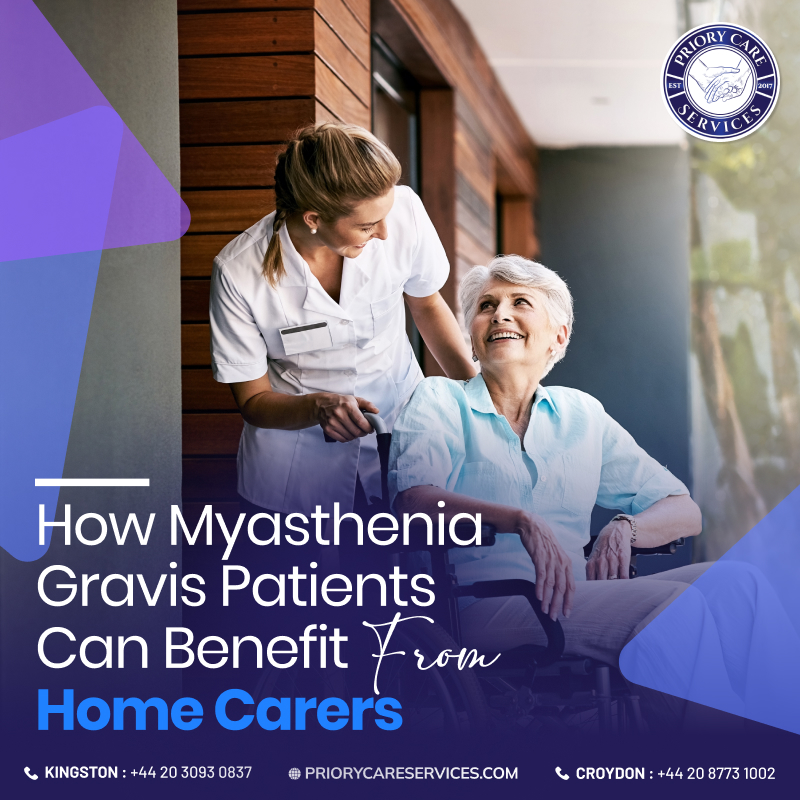Older adults are susceptible to a lot of medical issues, and one of them is Myasthenia Gravis (MG). It is a long-term autoimmune disease that disrupts daily body functions by causing fatigue and muscle weakness. So, simple tasks like eating, walking, and dressing become difficult for elderly people with MG. The symptoms of the disease need proper management and constant assistance, and here comes the role of daily home care services.
You can hire staff from a home care agency in Kingston Upon Thames, Croydon, or Bromley. This way seniors with MG can retain their freedom with the support of an in-home care provider, ensuring safety and well-being.
Understanding Myasthenia Gravis in Seniors
Muscle weakness results from the immune system interfering with the neuron-muscle link, which leads to myasthenia gravis. The disease typically affects the respiratory muscles, limbs, mouth, and eyes, and its symptoms might vary throughout the day. Some are:
• Muscle exhaustion that gets better with rest and gets worse with activity
• Dysphagia, or difficulty swallowing, and dysarthria, or difficulty speaking
• Arm, leg, and neck weakness that makes movement challenging
• Ptosis, or drooping eyelids, and blurred vision
• Breathing problems in extreme situations
How Daily Home Care Services Help Seniors with MG
A home care agency ensures that seniors with Myasthenia Gravis receive professional and compassionate care tailored to their unique needs. Here’s how they help:
1. Energy Conservation and Fatigue Management
The most common symptom of MG is fatigue, and it is the most debilitating. In this case, if one overexerts themselves, it can increase their weakness, so they should always pace everyday tasks. Here, a carer can assist them in planning their day to balance the durations for activity and rest. Assistance with domestic chores like cooking, cleaning, and laundry also saves the patient’s energy. Caregivers also conduct low-impact workouts, like mild stretching, to prevent muscular atrophy.
2. Assistance with Mobility and Fall Prevention
Elderly people are usually prone to suffering accidental falls. So people with MG are more likely to fall as they have more neck and leg weakness. Home carers keep the home environment safe and free of obstacles and assist with walking. When necessary, they also assist the elderly person to use mobility aids. Like if the patient uses wheelchairs, walkers, and canes. So, with a person to assist them, you can ensure safety, even if your home has installed grab bars and is free of trip hazards, making it fall-proof.
3. Support with Eating and Swallowing Difficulties
Dysphagia, or difficulty swallowing, can cause choking and malnutrition. Daily home care services create soft, easily digestible foods and promote modest, frequent meals. They manage their fluid intake to avoid dehydration, which can exacerbate weariness. Assisting with eating relieves tension and prevents aspiration.
4. Medication Management
MG patients also need to take drugs like immunosuppressants, corticosteroids, or pyridostigmine (Mestinon). It’s highly likely that elderly people might make mistakes when taking them by themselves. So to make sure that the medicines are taken on time, a caregiver is necessary who delivers medication reminders. They also monitor the person to identify any adverse symptoms like lightheadedness, nausea, or severe muscle weakness. They also follow doctors’ instructions to prevent the condition from worsening.
5. Respiratory Monitoring and Emergency Preparedness
In extreme situations, MG may weaken breathing muscles, leading to life-threatening situations. Carers closely watch for signs of respiratory distress, including difficulty in breathing. They make sure that seniors wear breathing aids, like BiPAP or oxygen therapy, as necessary. A home care organisation offers emergency support, providing a prompt response in urgent situations.
6. Emotional and Social Support
For most elderly people, living with MG can be lonely and also unpleasant in some cases. To have someone to take care of them can improve mental health. The companionship and activities like reading or discussion can further help prevent loneliness. Caregivers are specifically trained to make everyday life easier for people who have mobility issues. Whether it’s about going to doctor’s appointments or social events, carers help them through everything.
Read our other blog to know how domestic support services help people in post-surgery recovery.
Final Thoughts
Myasthenia Gravis can create a whole lot of issues for elderly people. But with the appropriate home care services, you get to preserve the patient’s independence as well as their quality of life. A skilled in-home caregiver is entitled to manage fatigue, prevent falls, aid with daily duties, and maintain the general well-being of the elderly person.
Consider working with a home care agency in Kingston Upon Thames, Croydon, or Bromley that is experienced with MG patients. You can get in touch with Priory Care Services to make sure the elderly family member lives more comfortably, safely, and peacefully at home.




